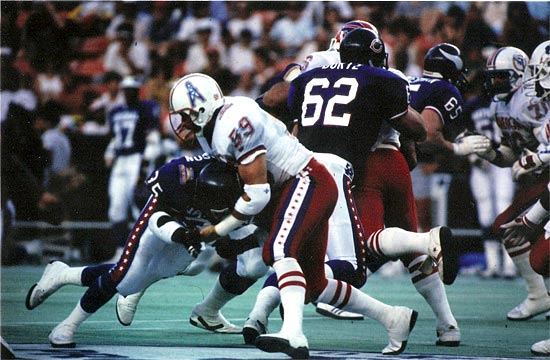The Hardest Hit
Pro athletes are donating their brains to BU for a study of the lasting effects of concussions
| From Commonwealth | By Caleb Daniloff John Grimsley (in white) suffered nine concussions playing in the National Football League. Photo courtesy of Virginia Grimsley
John Grimsley (in white) suffered nine concussions playing in the National Football League. Photo courtesy of Virginia Grimsley
In fall 2007, when former Houston Oilers linebacker John Grimsley forgot about his son’s engagement party, which he’d been helping to plan for months, his wife, Virginia, knew something was gravely wrong. Grimsley is convinced that her husband’s alarming memory trouble, and perhaps even his untimely death from a firearms accident early last year, was linked to the nine concussions he suffered during nine seasons on the gridiron. Now, thanks to a groundbreaking study under way at BU’s new Center for the Study of Traumatic Encephalopathy (CSTE), she is closer to a definitive answer.
When John Grimsley died, his wife donated his brain tissue to CSTE, where it was analyzed by BU pathologists. The results, released this fall, showed that Grimsley had pronounced chronic traumatic encephalopathy (CTE), a condition that is often seen in retired athletes, such as boxers, who have a history of repeated concussions. CTE is a progressive, degenerative disease associated with memory loss, confusion, impaired judgment, paranoid and aggressive behavior, depression, dementia, and parkinsonism. Grimsley, who played in the NFL from 1984 to 1993, is the fifth former player diagnosed with CTE since 2002. All five died untimely deaths.
Last February, Grimsley, who was forty-five, accidentally shot himself in the chest while cleaning his gun. “He’d grown up with guns his whole life,” says his wife. “Did he forget there was a bullet in the chamber? Was his visual perception off?”

Microscopic brain sections (left) from a sixty-five-year-old control subject, showing no abnormal deposit of tau protein; (middle) section from former NFL player John Grimsley’s brain, showing abundant deposits of tau protein, an indicator of the degenerative brain disease CTE; (right) section from a seventy-three-year-old world-champion boxer with end-stage CTE and dementia, showing severe tau protein deposition. Courtesy Ann McKee
Ann McKee, a BU School of Medicine associate professor of neurology and pathology and codirector of the new brain study center, says that while she cannot tie his condition directly to concussions suffered as an NFL linebacker, the pattern of degeneration is classic for CTE. “The only thing I can say is that this pattern of change is associated with multiple mild brain traumas, and he had a history of concussion — one medically documented case and eight more that were not. So most likely that had something to do with it.”
The new center is financed primarily by the University and a grant from the National Institutes of Health. It will operate in collaboration with the Sports Legacy Institute, a nonprofit founded last year by Chris Nowinski, a former Harvard University football player and professional wrestler and the author of Head Games: Football’s Concussion Crisis, and Robert Cantu, codirector of the Neurological Sports Injury Center at Brigham and Women’s Hospital in Boston.
The center will develop a multidisciplinary research program aimed at understanding CTE and its risk factors. It will also sign up former athletes for clinical studies, and it has launched a brain donation program for athletes, current and retired, with and without a history of concussions. A dozen athletes have already agreed to donate their brains after they die, including former NFL players Ted Johnson, Frank Wycheck, and Ben Lynch, former NHL player Noah Welch, and former women’s soccer standout Cindy Parlow.
Virginia Grimsley says she plans to reach out to more NFL players. “The stigma needs to go away that you’re a sissy if you come out of the game and don’t go back in,” she says. “A concussion is a big deal. It’s not just a ding.”

 Twitter
Twitter Facebook
Facebook
Comments
On 12 January 2009 at 7:44 AM, Rick K. Shapiro, MD (SED) wrote:
This is a very good place for studies.
On 7 January 2009 at 8:36 AM, Zenos M. Linnell, MD (MED'53) wrote:
As a resident at Boston State Hospital in Mattapan in Psychiatry in 1955, I took care of a retired boxer who had all the symptoms you mention of trauma to the brain. YOu might look at old records to find many such athletic injuries, if these records still exist. I remember this man's charm. He was usually such a harmless friendly giant who could tell you his whole story. He used to go into lady's rooms and expose himself, among other things. ZML
Post Your Comment